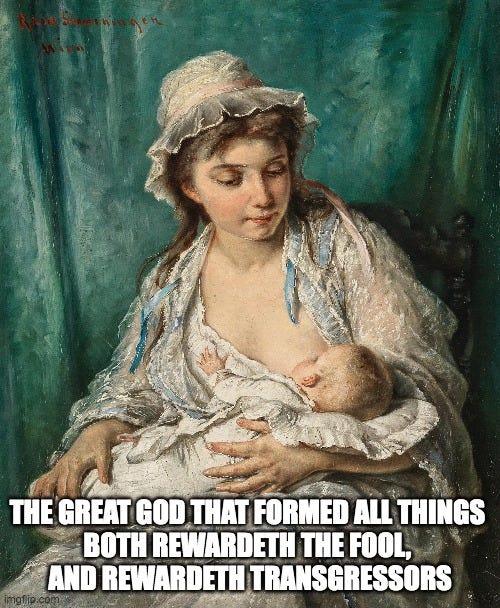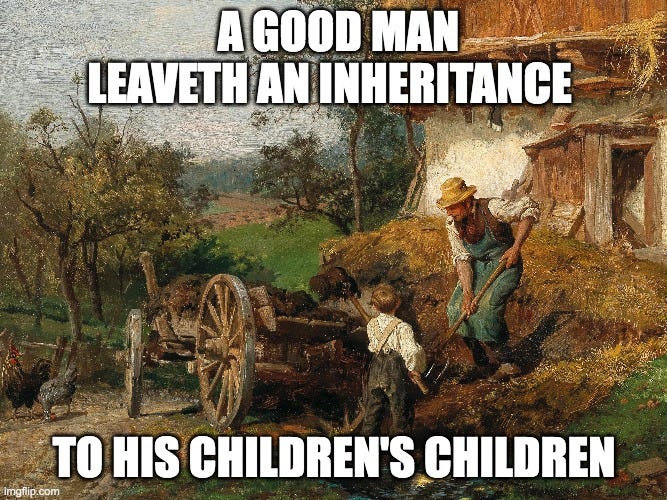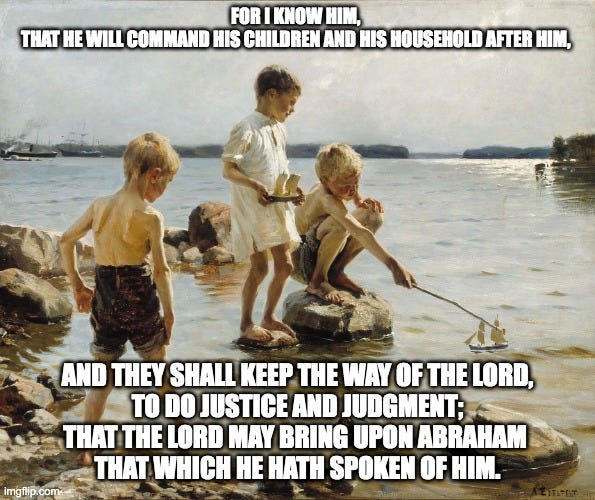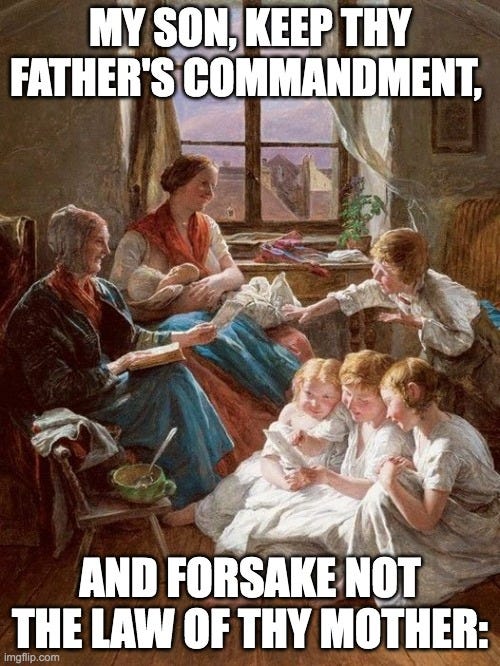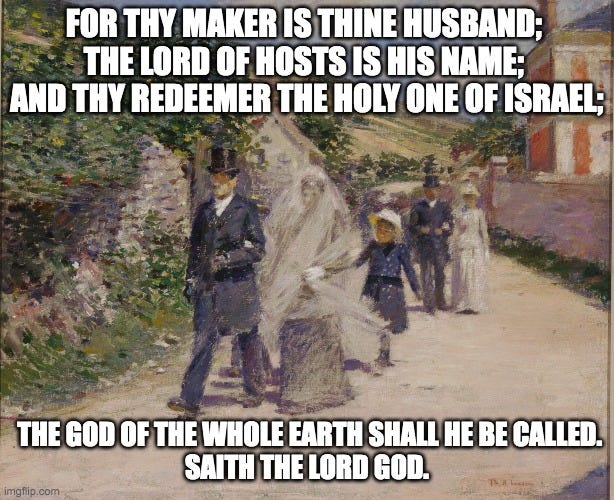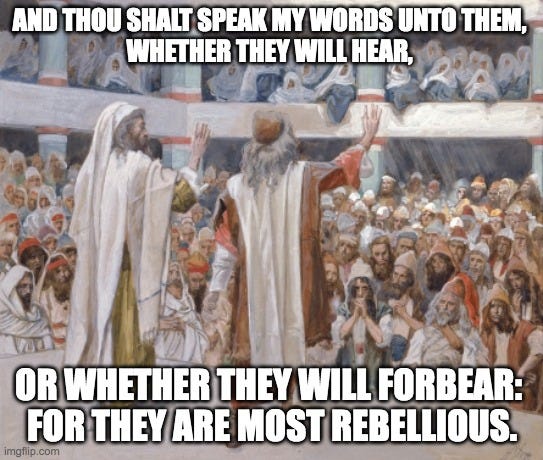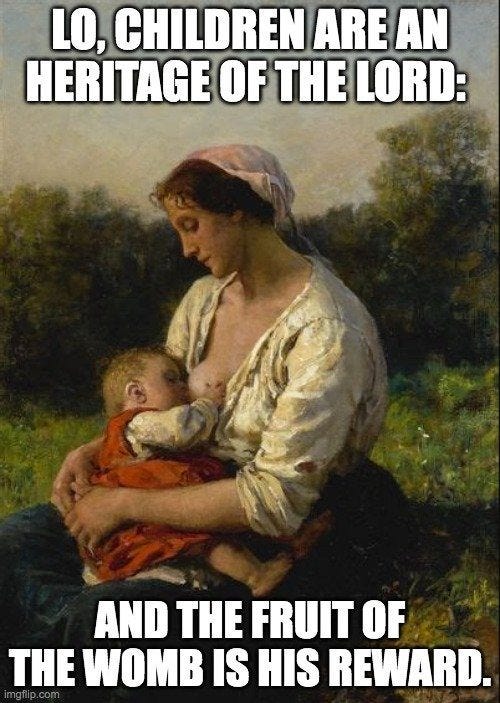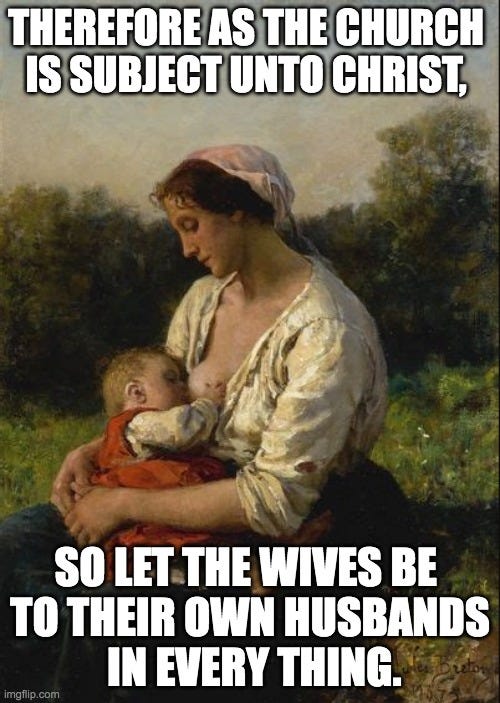Can one forbid that which is allowed? If God allows a thing, can a pastor, king, or father forbid it? Yes, and quite clearly. With limits.
Introduction
And Jeremiah said unto the house of the Rechabites, Thus saith the LORD of hosts, the God of Israel; Because ye have obeyed the commandment of Jonadab your father, and kept all his precepts, and done according unto all that he hath commanded you:
Therefore thus saith the LORD of hosts, the God of Israel; Jonadab the son of Rechab shall not want a man to stand before me for ever.
Jeremiah 35:18-19
This particular post is in reaction to my good friends un-post on the subject of the Rechabites. In that story Jonadab, the son of Rechab, forbade, among other things, for his descendants to drink wine. And my friend noted that that the Scriptures allow us to drink wine. Thus he stated that Jonadab, the son of Rechab, sinned in making this command. (Not something I would lightly do, accusing a patriarch of sin.).
Now, leaving aside the bit of hubris in accusing a patriarch of sin when God doesn’t, we still have this issue of forbidding that which is allowed. It may be pretty clear that we can’t allow that which God forbids… tell our children that Adultery is OK, for example. But can an authority forbid that which is allowed?
I believe that the answer is, “Yes… with careful judgement.”
Allowed or Commanded?
First of all, we have to make sure to make the distinction between something that is ‘allowed’ and something that is ‘commanded’. He brings up the issue of ‘forbidding to marry’. The problem there is that God’s Word often commands us to marry. So no lesser authority can come along and forbid it.
And I should note that had Jonadab the son of Rechab commanded his children not to marry, this story wouldn’t exist.
For Everyone, or those under our Jurisdiction?
Hopefully just as obviously, while it might be in our jurisdiction to make a rule that applies to those under our jurisdiction… no eating meat on Thursdays, or some such. It cannot possibly be under our jurisdiction to make a rule that covers everyone else. To say ‘No one on Earth may eat meat on Thursdays’, for example.
For Anything, or only those things under our Jurisdiction?
Hopefully just as obviously, we can only make rules for those under our jurisdictions for things under our jurisdiction. The Post Officer General, or whatever his name is, can, I suppose, regulate what size mailboxes we have out on the street, but he can’t tell us if we should eat meat on Thursdays or not.
What’s Left?
So now we have the question still on the floor. Can a Godly authority, acting in an area within his jurisdiction, commanding only those within his jurisdiction, forbid something which God has allowed? I believe that the answer is clearly ‘yes’, he has that authority. He may use it wrongly, but he has that authority.
What’s the Difference?
Let me make sure that the difference I just pointed out is stated clearly. It may be, indeed it often happens, that an authority makes a decision which is wrong… but within his authority. Suppose he punishes a child unjustly. It wasn’t that child that did it. It was his sister. That is a wrong decision., Perhaps evil, if the father did it intentionally, perhaps just mistaken. But wrong.
But that does not alter the responsibility of the child to obey the instructions given. If told to go to their room, or bend over to be paddled, they do not get to say, “No, this decision is wrong, so I don’t have to obey it.” That would only happen if the decision was outside of the jurisdiction of the person making the decision and, usually, it would mean that they had to disobey it, not that they merely could disobey it.
Doctrine vs Command
Now the Spirit speaketh expressly, that in the latter times some shall depart from the faith, giving heed to seducing spirits, and doctrines of devils;
Speaking lies in hypocrisy; having their conscience seared with a hot iron;
Forbidding to marry, and commanding to abstain from meats, which God hath created to be received with thanksgiving of them which believe and know the truth.
For every creature of God is good, and nothing to be refused, if it be received with thanksgiving:
For it is sanctified by the word of God and prayer.
I Timothy 4:1-5
Now in the original post he goes rather far and compares the command of Jonadab to his children to this passage in Timothy. He takes this patriarch, whom God praises, and accuses him of teaching ‘doctrines of demons’. Or, in the KJV, ‘devils’.
Leaving aside the several things that seem missing from the story of Jonadab… his leaving the faith, speaking lies, forbidding to marry, hypocrisy (Did Jonadab follow his own instructions? We are given no reason not to think so.) we end up with the ‘abstain from meats’, in which category my friend includes wine (which makes more sense if one understands the general meaning of the word to mean ‘food’). Now, leaving aside the fact that modern commentators seem to think that this end-times heresy will actually involve people teaching that we should return to the food laws commanded in the Old Testament (under which the Jews were at the time of Jonadab)…
The issue here is this: Did Jonadab teach a doctrine? A false doctrine?
Is there a difference between a doctrine and a command? When Paul wrote to Timothy about this ‘doctrine of devils’, one of which was to abstain from meats’, was this ‘doctrine’ a specific command by a specific authority to specific people? Or was it a ‘doctrine’? Was it some general teaching that these false teachers were saying God commanded for all men everywhere?
Or, to ask the question in reverse, when Jonadab, the son of Rechab, commanded his family to not drink wine, did he promulgate a ‘doctrine’? Is there a difference between a ‘doctrine’ and a ‘command’? If I say, “God’s Word clearly teaches that no one is to drink wine” is that different from my saying to my son, “You are not to drink wine.”?
Is there a difference between saying, “Wine is a bad thing” and “You are not to drink wine” Can there be an… exception to a general rule? That something is not allowed… except for certain people? Or, as here, something is generally allowed… with exceptions?
Do we have any reason to believe that Jonadab taught a doctrine of devils? That he denigrated God’s creation?
Where do we see this in Scripture?
Do we see, in Scripture, something generally allowed being forbidden, by God or others, to specific people? Much, in every way. Time and time again.
First of all, let us take pretty much all of the OT kosher laws. All sorts of perfectly legitimate meat forbidden by God to… the Israelites. Not generally, not to everyone… just to the Israelites.
Or their clothing laws. Seriously, God, what do you have against mixed cloth clothing? Well, generally, nothing. But not for the Israelites.
Can you marry a divorced woman? Generally, yes, but not if you were a priest.
Was wine legal in the Old Testament? Absolutely. Well, except for:
And the angel of the LORD said unto Manoah, Of all that I said unto the woman let her beware.
She may not eat of any thing that cometh of the vine, neither let her drink wine or strong drink, nor eat any unclean thing: all that I commanded her let her observe.
Judges 13:13-14
and for:
It is not for kings, O Lemuel, it is not for kings to drink wine; nor for princes strong drink:
Proverbs 31:4
So maybe you are getting tired of OT laws. Let’s go to the New Testament. Let’s see how Paul handles this situation. When discussing the New Testament Gentile believers and meat he clearly says,
I know, and am persuaded by the Lord Jesus, that there is nothing unclean of itself:
Romans 14:14a
There you go. All meats are OK for all believers… Oh, wait,
but to him that esteemeth any thing to be unclean, to him it is unclean.
But if thy brother be grieved with thy meat, now walkest thou not charitably. Destroy not him with thy meat, for whom Christ died.
Let not then your good be evil spoken of:
For the kingdom of God is not meat and drink; but righteousness, and peace, and joy in the Holy Ghost.
For he that in these things serveth Christ is acceptable to God, and approved of men.
Let us therefore follow after the things which make for peace, and things wherewith one may edify another.
For meat destroy not the work of God. All things indeed are pure; but it is evil for that man who eateth with offence.
It is good neither to eat flesh, nor to drink wine, nor any thing whereby thy brother stumbleth, or is offended, or is made weak.
Hast thou faith? have it to thyself before God. Happy is he that condemneth not himself in that thing which he alloweth.
And he that doubteth is damned if he eat, because he eateth not of faith: for whatsoever is not of faith is sin.
Romans 14:14b-23
Indeed he goes so far as to say:
Wherefore, if meat make my brother to offend, I will eat no flesh while the world standeth, lest I make my brother to offend.
I Corinthians 8:13
Conclusion
But meat commendeth us not to God: for neither, if we eat, are we the better; neither, if we eat not, are we the worse.
I Corinthians 8:8
It is always dangerous when you invent a doctrine that no one in the church has held before. It is incredibly dangerous when you accuse a Biblical patriarch of sin when God doesn’t. It is doubly so when you do so after God has praised him.
I am going to go out on a limb here and say that Jonadab, the son of Rechab, a man who received one of the most powerful blessings in the entire Scripture, was not teaching a doctrine of devils. I’m going to stand my ground on the principle that a given authority may, for those under his authority, in an area under his authority, with careful limits, forbid something that God generally allows. Be it wine, or meat, or building houses… there may be an exception to a general allowance.
I am going to conclude by pointing out that God put the patriarchs in the Scripture, on average, so that we might learn from them and emulate them… not condemn them.
Thank you for reading Von’s Substack. I would love it if you commented! I love hearing from readers, especially critical comments. I would love to start more letter exchanges, so if there’s a subject you’re interested in, get writing and tag me!
Being ‘restacked’ and mentioned in ‘notes’ is very important for lesser-known stacks so… feel free! I’m semi-retired and write as a ministry (and for fun) so you don’t need to feel guilty you aren’t paying for anything, but if you enjoy my writing (even if you dramatically disagree with it), then restack, please! Or mention me in one of your own posts.
If I don’t write you back it is almost certain that I didn’t see it, so please feel free to comment and link to your post. Or if you just think I would be interested in your post!
If you get lost, check out my ‘Table of Contents’ which I try to keep up to date.
Von also writes as ‘Arthur Yeomans’. Under that name he writes children’s, YA, and adult fiction from a Christian perspective. His books are published by Wise Path Books and include the children’s/YA books:
The Bobtails meet the Preacher’s Kid
and
As well as GK Chesterton’s wonderful book, “What’s Wrong with the World”, for which ‘Arthur’ wrote most of the annotations.
Arthur also has a substack, and a website.
Thanks again, God Bless, Soli Deo gloria,
Von
Links
Some posts very specifically about Jonadab, the son of Rechab
Jonadab, the Son of Rechab
·
22 JULY 2024
The words of jonadab
·
6 AUGUST 2024
The Context of Jonadab
·
13 AUGUST 2024
And Jeremiah said unto the house of the Rechabites, Thus saith the LORD of hosts, the God of Israel;
Three Godly Fathers
·
15 JUNE 2024
Related Issues
Other posts dealing with the meanings of the words obey, submit, command… and how these are worked out in Scripture.
Honour Thy Father: Adam to Abraham
·
3 OCTOBER 2024
Then came to Jesus scribes and Pharisees, which were of Jerusalem, saying,
Trust... and Obey
·
11 MAY 2024
Trust, Honour, and Obey
·
21 MAY 2024
As Sarah Obeyed Abraham...
·
23 MAY 2024
Obey: Appendix
·
21 MAY 2024
Submission in Silence
·
15 JUNE 2024
Parthenogenic Parenting
·
17 FEBRUARY 2024
Problems with Patterns of Patriarchy
·
10 JULY 2023
Functional Obedience
·
30 MAY 2024
Judging the Patriarchs
·
8 JUNE 2024




